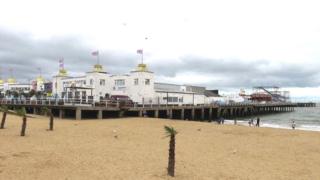 Image copyright
Steve Daniels/Geograph
Image copyright
Steve Daniels/Geograph
Ten times more men died on the UK's coast than women last year, according to the RNLI, which warned young men to be more safety conscious around water.
In 2017, 99 of the 109 adults that died on the coastline were men.
The RNLI said men's love of watersports and a tendency to be "risk takers" may contribute to the gender disparity.
July and August were the months in which coastal fatalities were most likely to occur over the past five years, with 98 deaths each.
Last week a boy, 16, died after getting into difficulty on a Welsh beach, while a six-year-old girl died after going into the sea at Margate harbour in Kent.
And on 26 July 15-year-old Ben Quartermaine drowned after being swept out to sea off Clacton Pier in Essex.
The RNLI said the majority of coastal deaths involved young men and asked that demographic to speak to each other about risks around the coast including "one of the biggest killers" - cold shock.
RNLI lifeguard supervisor Lewis Timson said: "When you jump into very cold water it sends your heart into a bit of a sporadic rhythm, throws breathing out and generally people thrash to get to safety. The current safety message is the complete opposite of that.
"Go on to your back, elevate your chin towards sky, put your arms out to your side and stay in that position for about a minute. Let your heart and breathing go back down to normal rhythm, then decide on the best course of action."
He said if young men heard the advice and shared it with a friend "down the pub or at the football, that one conversation could save a life".
The RNLI have also advised people not to go into water if they see someone struggling but instead call 999 and ask for the coastguard.